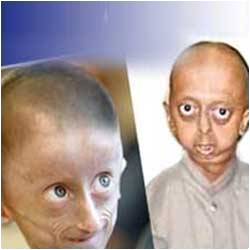 The risk of developing age-related diseases, such as multiple sclerosis, heart disease and cancer, has been linked with faster 'biological' aging in an international study led by researchers at the University of Leicester.The study involved scientists in 14 centres across 8 countries, working as part of the ENGAGE Consortium (list of research teams is give below). The research is published online today (27th March) in the journal Nature Genetics.
The risk of developing age-related diseases, such as multiple sclerosis, heart disease and cancer, has been linked with faster 'biological' aging in an international study led by researchers at the University of Leicester.The study involved scientists in 14 centres across 8 countries, working as part of the ENGAGE Consortium (list of research teams is give below). The research is published online today (27th March) in the journal Nature Genetics. The project studied a feature of chromosomes called telomeres. Telomeres sit on the end of our chromosomes - the strands of DNA stored in the nucleus of cells. The telomeres shorten each time a cell divides to make new cells, until they reach a critical short length and the cells enter an inactive state and then die. Therefore telomeres shorten as an individual gets older. But, individuals are born with different telomere lengths and the rate at which they subsequently shorten can also vary. The speed with which telomeres wear down is a measure of 'biological ageing'.
Professor Nilesh Samani, British Heart Foundation Professor of Cardiology at the University of Leicester and Director of the National Institute for Health Research (NIHR) Leicester Cardiovascular Biomedical Research Unit, who led the project said: "Although heart disease and cancers are more common as one gets older, not everyone gets them - and some people get them at an earlier age. It has been suspected that the occurrence of these diseases may in part be related to some people "biologically" ageing more quickly than others."
The research team measured telomere lengths in over 48,000 individuals and looked at their DNA and identified seven genetic variants that were associated with telomere length. They then asked the question whether these genetic variants also affected risk of various diseases. As DNA cannot be changed by lifestyle or environmental factors, an association of these genetic variants which affect telomere length with a disease also would suggest a causal link between telomere length and that disease.
The scientists found that the variants were indeed linked to risk of several types of cancers including colorectal cancer as well as diseases like multiple sclerosis and celiac disease. Most interestingly, the authors found that in aggregate the seven variants also associated with risk of coronary artery disease which can lead to heart attacks.
Professor Samani added: "These are really exciting findings. We had previous evidence that shorter telomere lengths are associated with increased risk of coronary artery disease but were not sure whether this association was causal or not. This research strongly suggests that biological ageing plays an important role in causing coronary artery disease, the commonest cause of death in the world. This provides a novel way of looking at the disease and at least partly explains why some patients develop it early and others don't develop it at all even if they carry other risk factors."
Professor Tim Spector from King's College London, who co-led the project added: "Our research over the last five years suggests that some people are genetically programmed to age at a faster rate. When exposed to 'detrimental ' environments for telomeres - like smoking, obesity, or lack of exercise - they are likely to become even biologically older and consequently be more at risk of age-related diseases like heart disease and cancer." Dr Mangino Massimo who was the lead analyst for King's College London, said: "This study included many UK twin volunteers and has been made possible by a great collaboration of scientists from across Europe. Our research is key to understanding the complex genetic jigsaw of a whole variety of human age-related diseases."Dr Veryan Codd, Senior Research Associate at the University of Leicester who co-ordinated the study and carried out the majority of the telomere length measurements said: "The findings open of the possibility that manipulating telomere length could have health benefits. While there is a long way to go before any clinical application, there are data in experimental models where lengthening telomere length has been shown to retard and in some situations reverse age-related changes in several organs."
Source: journal Nature Genetics.


No comments:
Post a Comment